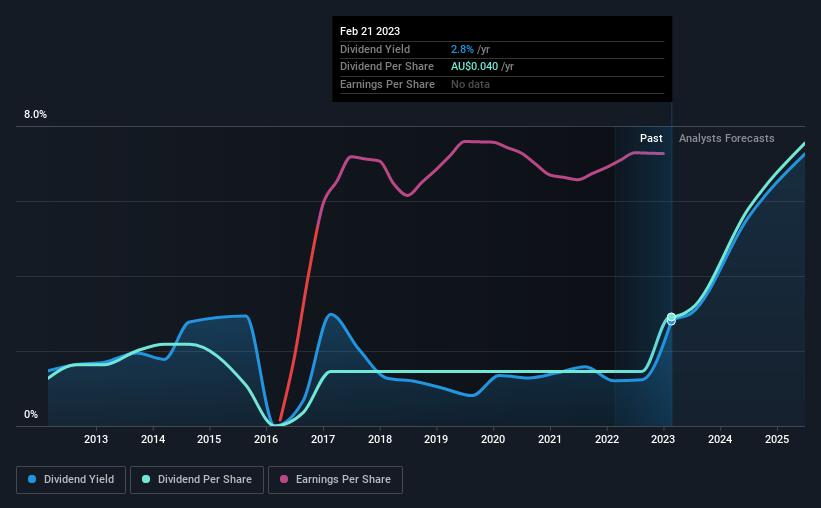Beach Energy Limited (ASX:BPT) Goes Ex-Dividend Soon
Some investors rely on dividends for growing their wealth, and if you're one of those dividend sleuths, you might be intrigued to know that Beach Energy Limited (ASX:BPT) is about to go ex-dividend in just four days. The ex-dividend date is one business day before the record date, which is the cut-off date for shareholders to be present on the company's books to be eligible for a dividend payment. The ex-dividend date is important as the process of settlement involves two full business days. So if you miss that date, you would not show up on the company's books on the record date. This means that investors who purchase Beach Energy's shares on or after the 27th of February will not receive the dividend, which will be paid on the 31st of March.
The company's next dividend payment will be AU$0.02 per share, and in the last 12 months, the company paid a total of AU$0.04 per share. Last year's total dividend payments show that Beach Energy has a trailing yield of 2.8% on the current share price of A$1.43. If you buy this business for its dividend, you should have an idea of whether Beach Energy's dividend is reliable and sustainable. As a result, readers should always check whether Beach Energy has been able to grow its dividends, or if the dividend might be cut.
View our latest analysis for Beach Energy
Dividends are typically paid out of company income, so if a company pays out more than it earned, its dividend is usually at a higher risk of being cut. Beach Energy paid out just 14% of its profit last year, which we think is conservatively low and leaves plenty of margin for unexpected circumstances. A useful secondary check can be to evaluate whether Beach Energy generated enough free cash flow to afford its dividend. Over the past year it paid out 194% of its free cash flow as dividends, which is uncomfortably high. It's hard to consistently pay out more cash than you generate without either borrowing or using company cash, so we'd wonder how the company justifies this payout level.
While Beach Energy's dividends were covered by the company's reported profits, cash is somewhat more important, so it's not great to see that the company didn't generate enough cash to pay its dividend. Cash is king, as they say, and were Beach Energy to repeatedly pay dividends that aren't well covered by cashflow, we would consider this a warning sign.
Click here to see the company's payout ratio, plus analyst estimates of its future dividends.
Have Earnings And Dividends Been Growing?
Stocks with flat earnings can still be attractive dividend payers, but it is important to be more conservative with your approach and demand a greater margin for safety when it comes to dividend sustainability. Investors love dividends, so if earnings fall and the dividend is reduced, expect a stock to be sold off heavily at the same time. With that in mind, we're not enthused to see that Beach Energy's earnings per share have remained effectively flat over the past five years. We'd take that over an earnings decline any day, but in the long run, the best dividend stocks all grow their earnings per share. Earnings have been growing somewhat, but we're concerned dividend payments consumed most of the company's cash flow over the past year.
Many investors will assess a company's dividend performance by evaluating how much the dividend payments have changed over time. In the last 10 years, Beach Energy has lifted its dividend by approximately 8.6% a year on average.
To Sum It Up
Has Beach Energy got what it takes to maintain its dividend payments? Earnings per share have been effectively flat over this time, and Beach Energy's paying out less than half its profits and 194% of its cash flow. Only rarely do we find companies paying out a low percentage of their profits yet a high percentage of their cash flow, so we'd mark this as a concern. Overall, it's not a bad combination, but we feel that there are likely more attractive dividend prospects out there.
So if you want to do more digging on Beach Energy, you'll find it worthwhile knowing the risks that this stock faces. Case in point: We've spotted 1 warning sign for Beach Energy you should be aware of.
If you're in the market for strong dividend payers, we recommend checking our selection of top dividend stocks.
Have feedback on this article? Concerned about the content? Get in touch with us directly. Alternatively, email editorial-team (at) simplywallst.com.
This article by Simply Wall St is general in nature. We provide commentary based on historical data and analyst forecasts only using an unbiased methodology and our articles are not intended to be financial advice. It does not constitute a recommendation to buy or sell any stock, and does not take account of your objectives, or your financial situation. We aim to bring you long-term focused analysis driven by fundamental data. Note that our analysis may not factor in the latest price-sensitive company announcements or qualitative material. Simply Wall St has no position in any stocks mentioned.
Join A Paid User Research Session
You’ll receive a US$30 Amazon Gift card for 1 hour of your time while helping us build better investing tools for the individual investors like yourself. Sign up here

 Yahoo Finance
Yahoo Finance 
